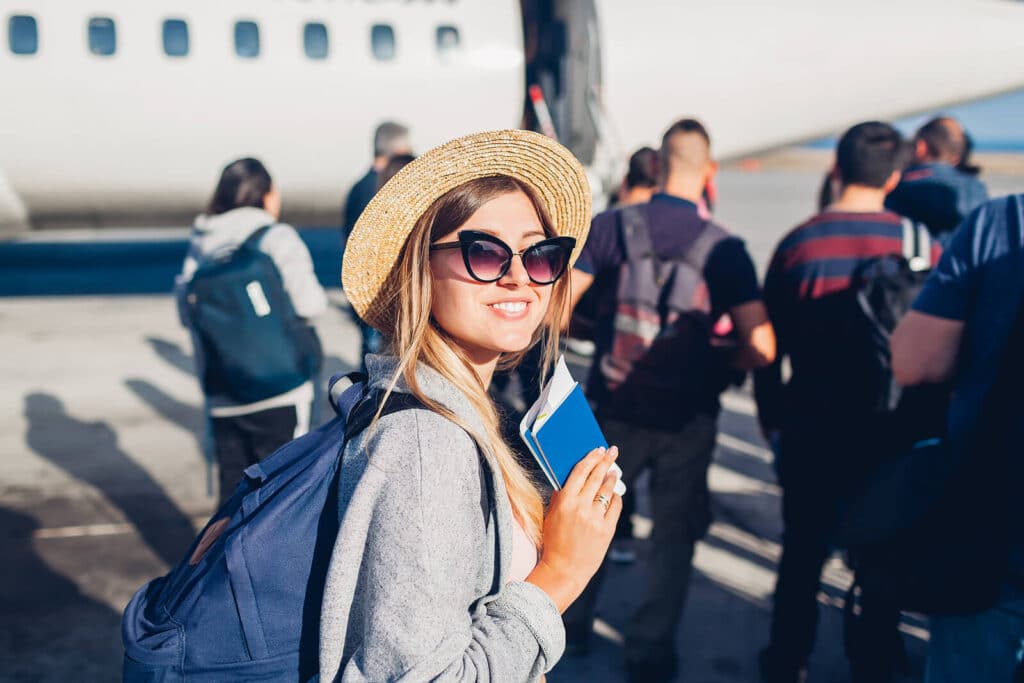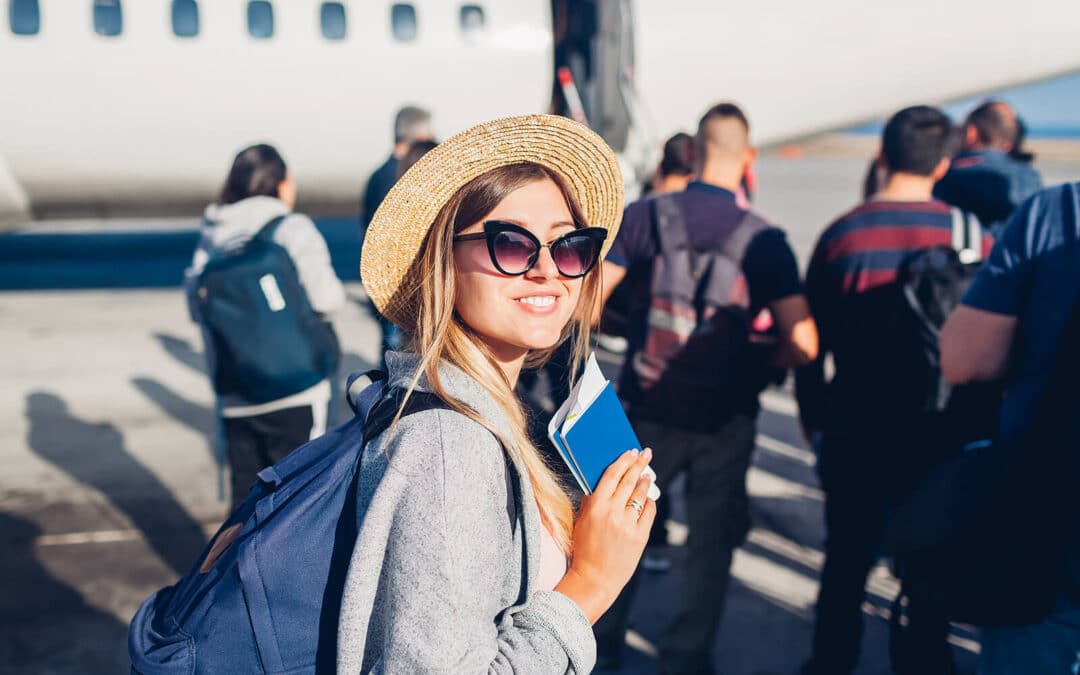Are you planning to travel after breast augmentation? It’s natural to have concerns about air travel with new implants or flying after mastectomy surgery. Whether you’re heading home after surgery or visiting family and friends, knowing how air travel can affect your recovery is important.
Understanding the best practices, having the right post-surgical products, and learning about potential challenges can help you navigate the skies confidently and comfortably, ensuring a safe and smooth journey.

When Is It Safe To Fly After Surgery?
If you’ve recently had breast surgery and are eager to know when it’s safe to take to the skies, you need to plan ahead and ensure your body has had enough time to heal. A general guideline is to wait at least 10 days before flying after breast augmentation surgery.
For those who have undergone a mastectomy, the recommended waiting period can be longer, often around 6 weeks. This allows your body ample time to start healing and reduces the risk of complications while you’re in the air.
However, several other factors can influence the timeline for safe air travel after breast surgery:
- Type of Surgery. Breast augmentation generally requires less recovery time compared to more extensive surgeries like a mastectomy.
- Healing Progress. Factors like overall health, age, and how well you follow post-operative care instructions can affect your healing time.
- Complications. You’ll need to attend follow-up appointments after your surgery to monitor your healing and any complications that occur. If you experience complications, such as infections, excessive swelling, or capsular contracture, your surgeon might advise you to delay travel until these issues are resolved.
What Are the Potential Risks of Flying Too Soon?
Before you book your flight, it’s crucial to understand the potential risks of flying too soon and how they could impact your recovery. Some common complications to be aware of include:
Increased Risk of Blood Clots
One of the biggest risks of flying too soon after breast surgery is the increased chance of developing blood clots, especially deep vein thrombosis (DVT). Sitting for extended periods on a plane can lead to poor blood circulation, which can cause clots to form in your legs.
If these clots move up your lungs, they can lead to a potentially life-threatening condition called pulmonary embolism. To minimize this risk, walk around the cabin periodically, wear compression stockings, and stay well-hydrated.
Unintended Pressure on Incisions
Flying too soon after surgery can place unintended pressure on your incisions due to changes in cabin pressure and the physical demands of carrying luggage or navigating the airport. This pressure can cause discomfort and may even lead to your incisions reopening or becoming irritated.
Wear loose, comfortable clothing to minimize this risk and avoid heavy lifting. However, the best approach is to allow your body ample time to heal before taking to the skies.
Delayed Healing and Infections
Traveling too soon after surgery can slow down your healing process and raise the risk of infections. The stress of travel, combined with exposure to new environments and germs, can make your body more vulnerable.
When your immune system is focused on healing surgical wounds, it may not be as effective at warding off other infections. It’s essential to ensure your incisions are well-healed and that you’re free from any signs of infection before you fly.
Decompression Sickness
The Bends, a well-known scuba diving issue, could be a potential in-flight problem for people who have undergone a breast augmentation or reconstruction after a mastectomy.
Research has revealed that changes in altitude may cause dissolved gases in the blood to form pockets of gas between the implant and the surrounding tissue. This phenomenon doesn’t cause the implants to expand or rupture, but it can lead to mild discomfort and temporary sensations like dizziness or nausea.
Late Hematoma
In rare cases, you may experience a severe hematoma. Although hematomas sometimes occur in the first 3 days following breast surgery, they are easily treatable and often do not have any long-term consequences.
However, there was a 2024 case study on a woman who experienced bilateral hematomas during a flight. It was suggested that the low atmospheric pressure inside the cabin led to an increase in blood pressure that exacerbated post-operative swelling that was already present.
How To Prepare for the Flight
You’ve had your breast augmentation surgery, allowed two weeks for healing, and now you’re ready to take to the skies. Preparing properly before your flight ensures a comfortable trip. Here’s how to get prepared and make your travel experience as pleasant as possible:
Medical Clearance
Before booking your flight, get medical clearance from your surgeon. They will evaluate your healing progress and determine your readiness to fly. Be open about any discomfort or concerns so they can offer the best advice for your situation. Having your doctor’s approval ensures you’re physically prepared for the journey.
Documentation and Prescriptions
Ensure you have all the necessary documentation, including medical records or doctor’s notes, in case you need to present them at the airport or to flight staff. Pack your prescriptions in your carry-on, bringing enough medication for the entire trip plus a little extra in case of delays. Keeping them in their original containers will help you avoid any issues at security checkpoints.
Compression Garments and Clothing
Compression garments, like the ABC Active Recovery Bra, are essential for supporting your healing tissues and reducing swelling during your flight. Follow your surgeon’s instructions on wearing them, and opt for loose, comfortable clothing to avoid unnecessary pressure on your incisions. Choose easy-to-remove layers, as airplane cabins can vary in temperature.
Hydration and Nutrition
Staying hydrated is crucial for reducing swelling and maintaining overall health during air travel. Bring a reusable water bottle and fill it up after clearing security. Snack on nutritious options like fruits, nuts, or yogurt to keep your energy levels up and support your recovery. Avoid salty snacks and alcohol, as they can cause dehydration and increase bloating and swelling.
Enjoy Stress-Free Travel After Breast Surgery
With the proper preparation and support, flying after a mastectomy or breast augmentation can be safe. As you plan your trip, remember that caring for your body is essential for a stress-free journey. From managing cabin pressure to maximizing comfort, having the right apparel can make a big difference in ensuring a positive in-flight experience.
At A Fitting Experience Mastectomy Shoppe, we understand the importance of proper support during recovery. Our team offers professional fittings for compression garments, including bras and vests, to help you heal comfortably and confidently. Our certified fitters can help you find the perfect fit to aid your recovery and make your travels as comfortable as possible.
Contact us to book a personalized fitting and experience the difference that specialized care can make.

 Since 1997
Since 1997


